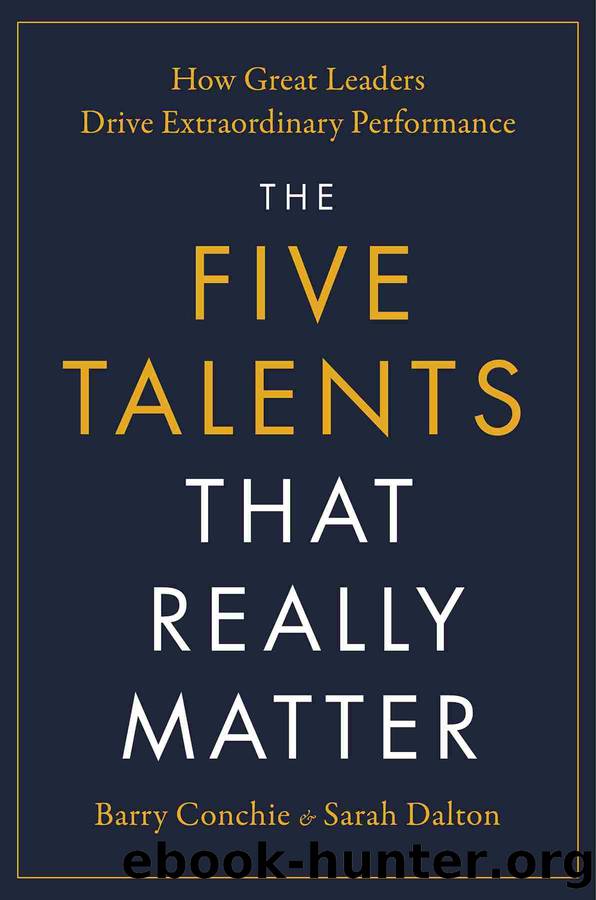The Five Talents That Really Matter by Barry Conchie & Sarah Dalton

Author:Barry Conchie & Sarah Dalton [Conchie, Barry and Dalton, Sarah & Dalton, Sarah]
Language: eng
Format: epub
Publisher: Hachette Books
Published: 2024-08-27T00:00:00+00:00
⢠Has this leader achieved good outcomes previously?
⢠Do they have a record of doing exactly what they said they would do?
⢠Have their advice and guidance been right before?
⢠Do they seem to be in command and demonstrate a comprehensive understanding of the issues they are dealing with?
⢠Even though we might disagree, do they seem to have my best interests in mind?
The problem and challenge in establishing credibility is that it is difficult for a person to determine this about themselves. Few organizations have successfully built feedback-rich environments, and it is often difficult for a leader to truly understand where they stand with others and how they are perceived. A 360 assessment can help, especially when a leader has been leading a team for some time and true perspectives have not already been drawn out. But the problems with 360s, and the ânoiseâ they amplify, is that they rarely lead to accurate outcomes. At a time when âfeedbackâ is attracting much more attention on business bookshelves, the difficulties in providing feedback are not easily addressed.
Kim Scottâs answer in her 2019 book, Radical Candor: Be a Kick-Ass Boss Without Losing Your Humanity, is to focus on shooting straight, cutting through the BS, and saying exactly what you feel.11 But rather than cutting through the BS, this idea creates piles of its own. Saying something more directly doesnât help anyone if it has no objectivity. Itâs a little like believing, when traveling through a foreign country where we donât speak the language, that shouting loudly and waving our arms around will make it easier for the other person to understand us. Marcus Buckingham and Ashley Goodall, in their excellent 2019 Harvard Business Review article âThe Feedback Fallacy,â skewer, fillet, and completely demolish this line of reasoning in a way that we approve.12
They explain in simple and powerful terms that too few companies have developed feedback as a dominant area of expertise. We have encountered too many individuals in our work who, in answer to the question âWhat feedback have you recently received about yourself?,â talk in ways that suggest that few conversations of this type take place in the organization, or the ones that have taken place focused on negative, unrealistic expectations of how a person can legitimately improve. âWell, I havenât ever been given feedbackâ is a common and disappointing response. This perspective is a bit hit-and-miss, and this is why individuals struggle with objective self-appraisal and the level of trust and credibility this justifies. Buckingham and Goodall argue that the best advice for individuals to learn about their credibility is to ask each of their individual colleagues in turn, because this is the only valid perspective.
Download
This site does not store any files on its server. We only index and link to content provided by other sites. Please contact the content providers to delete copyright contents if any and email us, we'll remove relevant links or contents immediately.
Hit Refresh by Satya Nadella(9110)
The Compound Effect by Darren Hardy(8912)
Change Your Questions, Change Your Life by Marilee Adams(7724)
Nudge - Improving Decisions about Health, Wealth, and Happiness by Thaler Sunstein(7684)
The Black Swan by Nassim Nicholas Taleb(7092)
Deep Work by Cal Newport(7047)
Rich Dad Poor Dad by Robert T. Kiyosaki(6583)
Daring Greatly by Brene Brown(6493)
Principles: Life and Work by Ray Dalio(6391)
Playing to Win_ How Strategy Really Works by A.G. Lafley & Roger L. Martin(6192)
Man-made Catastrophes and Risk Information Concealment by Dmitry Chernov & Didier Sornette(5987)
Digital Minimalism by Cal Newport;(5742)
Big Magic: Creative Living Beyond Fear by Elizabeth Gilbert(5731)
The Myth of the Strong Leader by Archie Brown(5484)
The Slight Edge by Jeff Olson(5401)
Discipline Equals Freedom by Jocko Willink(5365)
The Motivation Myth by Jeff Haden(5196)
The Laws of Human Nature by Robert Greene(5144)
Stone's Rules by Roger Stone(5068)
